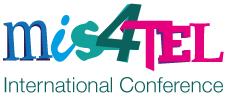Contact us: info@mis4tel-conference.net
Information
Scope
In the field of nursing, learning outcomes involve nurses both as learners and as educators.
As learners, they are involved in basic and post-basic academic programs, whereas they act as educators when they are engaged in health educational programs aiming to enhance community health-literacy levels.
According to some evidence, the quality of learning outcomes in basic and post-basic nursing academic programs could be potentially improved by technology-based systems like simulation and blended learning models. However, little is known about the use of technology to enhance community health-literacy levels.
This workshop aims to share the best available knowledge about the application of technology-based systems into basic and post-basic nursing academic programs, and into health educational programs aiming to enhance community health-literacy levels.
In order to pursue this intent, workshop topics have been grouped into the following three main discussion aims.
First, topics on education in nursing academic programs aim to discuss the effects of simulation and other technology-based systems on learning quality, including ethical and legal aspects.
Secondly, topics on community-health educational programs aim to discuss the impact of technology in improving community health-literacy levels.
Finally, the workshop intends to provide a complete overview of technology-based methods as useful tools to improve the learning of the nursing process in clinical settings.
Topics
The workshop welcomes submissions regarding the utilization of technology-based systems for learning improvement in the field of nursing, specifically dealing with:
- Traditional simulation methods (e.g. role-playing, standardized patient, part-task trainer)
- Software-based and web-based simulation
- High-fidelity simulation
- Simulated scenarios
- Impact of nursing learning outcomes on patient safety
- Information Communication Technology (ICT)
- Training the trainers
- Interactive assessment
- Student engagement
- E-learning and e-education
- Impact of electronic systems for clinical documentation on learning of nursing process
- Impact of electronic health records using standardized taxonomies on learning of nursing process
- Blended learning models
- Technology-enhanced learning methods in community-health educational programs
- Health literacy and technology
Committee
Organizing Committee
Prof. Loreto Lancia – Associate Professor of Nursing – University of L’Aquila (Italy)
Prof. Rosaria Alvaro – Associate Professor of Nursing – University of Tor Vergata (Italy)
